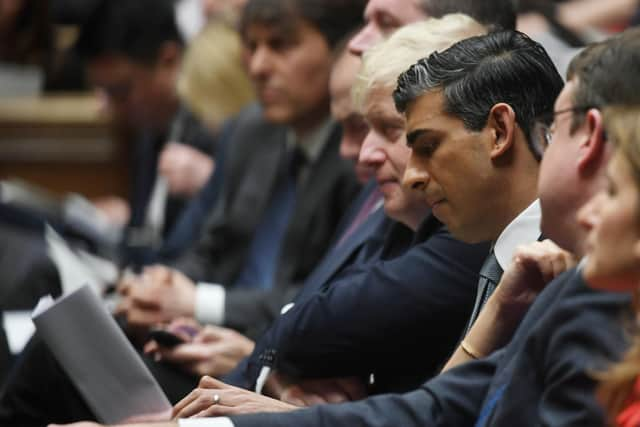Sunak warns finances could get 'significantly' worse as living standards set to fall to lowest rates ever
Savings were available at the petrol pump from last night and the lowest earners have been shielded from next month’s National Insurance increase, but the Chancellor was accused of still being “woefully out of touch” with the financial reality facing families up and down the country.
Economic growth forecasts have been downgraded and inflation is expected to reach its highest level in 40 years, meaning that real household disposable incomes are set to fall by 2.2 per cent by person in 2022-23.
Advertisement
Hide AdAdvertisement
Hide AdThe Office for Budget Responsibility (OBR) says this will be the biggest hit in a single year since records began in 1956-57.


Chancellor Mr Sunak braced the public for purse strings to tighten even further, with the full impact of Russia’s invasion of Ukraine still not being known.
Delivering his Spring Statement to the House of Commons, Richmond MP Mr Sunak said: “The OBR has not accounted for the full impacts of the war in Ukraine and we should be prepared for the economy and public finances to worsen – potentially significantly.
“And the cost of borrowing is continuing to rise.
In the next financial year, we’re forecast to spend £83bn on debt interest – the highest on record. And almost four times the amount we spent last year.”
Advertisement
Hide AdAdvertisement
Hide AdInflation is forecast to hit 8.7 per cent in the fourth quarter of 2022 and to average 7.4 per cent over the year, with wages failing to keep pace with rising prices.
The OBR said inflation – combined with rising taxes – will “weigh heavily on living standards in the coming 12 months”.
Amid the projections, Mr Sunak laid out a number of measures designed to trim household costs following repeated calls for the Government to intervene on the rising cost of living.
But Labour accused him of leaving “households and businesses to fend for themselves in the middle of a devastating cost-of-living crisis” by not going further.
Advertisement
Hide AdAdvertisement
Hide AdMr Sunak announced a reduction in fuel duty, “not by one, not even by two, but by 5p per litre”.
He also lowered the threshold at which workers start paying National Insurance, “in one go, this year”. Nearly 30 million workers will have their taxes cut through the rise in the threshold at which NI is paid,
There had been widespread calls for the increase to fund the Health and Social Care levy from next month to be scrapped, but instead “from this July, people will be able to earn £12,570 a year without paying a single penny of income tax or National Insurance”.
There was also a promise that the basic rate of income tax will reduce from 20p per £1 to 19p in the next two years, and the removal of VAT on sustainable home improvements such as solar panels and heat pumps.
Advertisement
Hide AdAdvertisement
Hide AdMr Sunak said the statement “puts billions back into the pockets of people across the UK and delivers the biggest net cut to personal taxes in over a quarter of a century.
“Like our actions against Russia, I have been able to do this because of our strong economy and the difficult but responsible decisions I have had to make to
rebuild our finances following the pandemic.”
Pat McFadden, Labour’s shadow Treasury chief secretary, said Mr Sunak had “left households and businesses to fend for themselves in the middle of a devastating cost-of-living crisis”.
“The OBR has confirmed today the biggest hit to household incomes on record,” he said.
Advertisement
Hide AdAdvertisement
Hide Ad“Even after the changes today, under the Conservatives, Britain is facing the highest tax burden in 70 years, with the Chancellor confirming £24bn of additional tax rises about to hit.”
Think-tank the IPPR said the Chancellor had not “offered the help that many households need” at the moment. Executive Director Carys Roberts said: “We’re going into the biggest incomes squeeze in a generation and yet the Chancellor hasn’t offered the help that many households need.
“His plan is woefully out of touch with the reality facing millions of families, who face being pulled into poverty and debt.
“To prevent the cost of living crisis becoming a living standards catastrophe, the Chancellor needed to find ways to get targeted support to those with the greatest need – but he has sadly failed to ‘do what it takes’.”